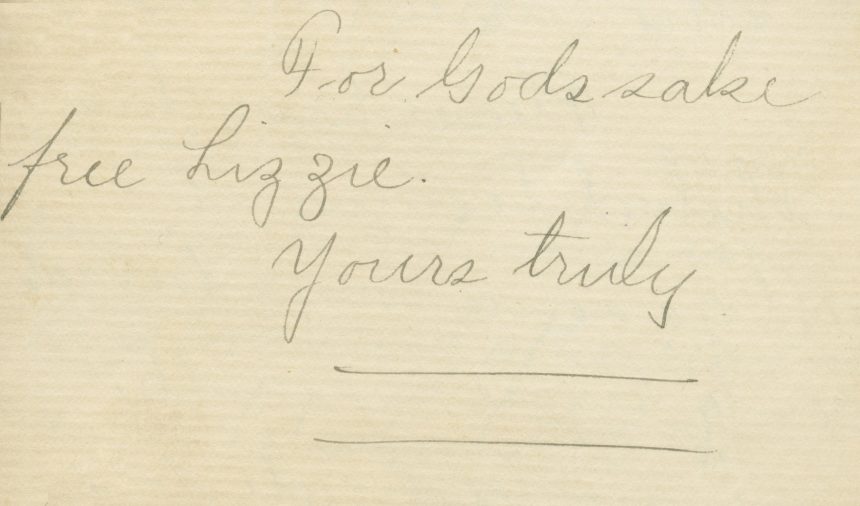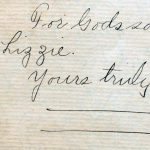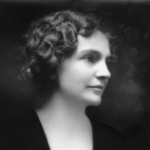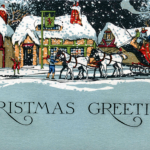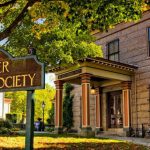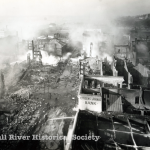I have often said that there is an amazing array of material out there, held in private collections, and that one never knows what fascinating artifacts may arrive at the FRHS on any given day, as the following illustrates.
In 1989, Frank Warren Knowlton Jr. (1912-2000), the grandson of former District Attorney Hosea Morrill Knowlton (1847-1902)—the latter, prosecuting attorney in the infamous Commonwealth of Massachusetts vs. Lizzie A. Borden—contacted the FRHS to discuss an extensive collection of manuscripts in his possession, retained from his grandfather’s personal files pertaining to the Borden case.
Frank’s offer: To donate the entire collection to the FRHS.
Outside the Knowlton family, the collection was virtually unknown: the author, Edmund Lester Pearson (1880-1937) had been granted access in the 1920s and 30s, and referenced some material in his writings, but its existence had been overlooked and/or fairly forgotten by subsequent researchers.
News of its existence and contribution stunned the Borden world and made headlines worldwide—researchers and scholars clamored for the opportunity to examine the documents. This was the first extensive collection of primary source material on the Borden case to ever surface, and its unprecedented scale was matched by its importance, with the collection comprising 346 manuscripts, a notebook, two scrapbooks, and four trial exhibit photographs.
In short: It was a mindboggling array of choice material.
It was the Holy Grail.
Its importance could not be overstated.
There was a plethora of material: legal documents, telegrams, and transcripts, offering rare insight into the methods employed by the prosecution as they built their case, and their interactions with Lizzie Borden’s defense team.
There was a wide variety of letters, notes, and postcards, sent to Knowlton from the United States and abroad. There were those from brilliant legal professionals, practicing and retired; from erudite—or in many cases, not—individuals caught up in the day-to-day drama that was the Borden case, either signed with given names, pseudonyms, or simply anonymous; and those from a number of characters perhaps best described as peculiar. One poor dear—doggedly determined, apparently—managed to have her scribblings mailed from her room while confined to an insane asylum in Maine.
Knowlton heard from clairvoyants and the clergy, from businessmen and physicians to practitioners of the Ouija Board, spinsters of good family, and spiritualists. There was even a “confession.”
Fascinating.
With the approval of the donor, the FRHS closed access to the collection pending cataloguing and transcription, and following five years of exhaustive research The Commonwealth of Massachusetts vs. Lizzie A. Borden: The Knowlton Papers 1892-1893 was published in 1994.
The first – in fact, the only – edition of the book was printed in a run of 1100 hardbound copies, all of which sold out in less than one year. Today a sought after title for collectors of Borden memorabilia, the book now commands a premium on the secondary market.
But as it turns out, the collection was not complete, though Frank was not aware of it.
One letter had gone astray.
An email alerted us to the fact, and it was, once again, a Knowlton descendant who proposed giving the letter to the FRHS, thus completing the collection.
In the words of the donor: “I recently found a letter … to Hosea Knowlton from some “witnesses.” I doubt that they were correct in their assessment but thought you might like to add the letter to the collection. I am so glad that you continue to be appreciative of the Knowlton Papers.”
The answer to this generous offer: “Yes, thank you.”
The letter arrived at the FRHS on Monday last.
The missive was handwritten on a single fold sheet of Whiting’s Standard note paper in a clear hand, indicating that its author was educated, and had access to quality writing materials; it is undated and unsigned, but the content indicates that it was likely written during the late summer, on a Monday evening in 1892. The content—if factual—indicates that it was dispatched from Boston; the original envelope has not survived, hence no postmark.
So, what does it say?
Is it a smoking gun?
No—it is not.
But it is interesting as a period piece and provides a clear indication of the public fascination—the mania, really—that swept the nation as people followed the drama of the Borden case with rapt attention.
There were those who empathized with Lizzie Borden, viewing her as an innocent victim, while others, equally adamant, thought her guilty of the horrific crime of double parricide; both factions enthusiastically gave Knowlton their opinions.
In one case, the anonymous author of a note, penned on a Monday evening in late summer, 1892, pleaded: “For Gods sake free Lizzie.”
Stay tuned.
The content of the letter will be posted here on August 4th.
Fitting, is it not?

